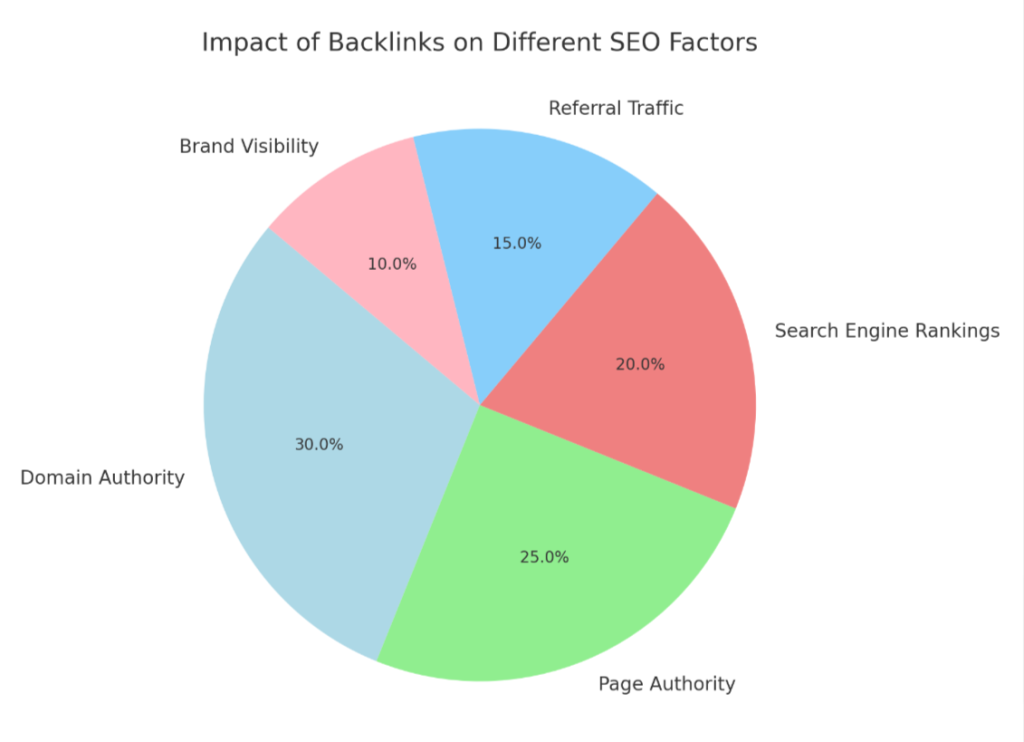Strengthening SEO Writing with Quality Backlinks
Are you finding it difficult to push your website higher on Google search results? You’re not alone – many struggle with this, mainly because they overlook a crucial aspect of SEO: backlinks.
This article will dive into the nitty-gritty of backlinks, from their importance in augmenting your site’s visibility to ethical practices for building them. Ready to climb up those rankings? Let’s go!
Key Takeaways
- Backlinks are links from one website to another and play a crucial role in SEO by indicating credibility and authority.
- High – quality backlinks improve search engine rankings and drive organic traffic to your website.
- Ethical practices for building backlinks include creating valuable content, reaching out to relevant websites, and avoiding spammy techniques.
What are Backlinks and Why Are They Important for SEO?
Backlinks are links from one website to another, and they play a crucial role in SEO by indicating the credibility and authority of a webpage.
Definition of backlinks
Backlinks, also known as inbound links or incoming links, are created when one website links to another. They serve as a signal to search engines that others vouch for your content.
More backlinks from high-quality sites mean better rankings in the search engine results pages (SERPs). From an SEO perspective, these links contribute to a site’s overall visibility and ranking capability on the web.
Thus, they play a crucial role in enhancing organic traffic and improving online presence.
Importance of backlinks for SEO
Search engines use backlinks as a significant factor in determining a website’s ranking. This is due to the perception of backlinks as votes of confidence from other websites, signaling to search engines that your content holds value and relevance in your field.
Earning high-quality backlinks not only increases your site’s visibility but also enhances its authority and credibility. Backlinking, therefore, plays an essential role in SEO optimization by directing organic traffic towards your webpage while improving your page ranking on Google’s algorithm.
Sites with more quality backlinks tend to rank higher, setting them apart from the competition. So, maintaining a strong link building strategy can significantly boost your SEO efforts.
On the flip side, giving backlinks also has its benefits for SEO practices. Linking out to other credible sources strengthens the relevancy signal for search engine rankings and adds value to your web page by providing additional resources or information related to your content.
While striving for quantity might seem like an appealing approach initially, it is essential always to prioritize quality over quantity when it comes down to gaining backlinks or linking out because each link represents a direct reflection of the kind of brand you want people associate with.
In conclusion, mastering ethical practices such as creating valuable content worth linking too and avoiding spammy techniques will help you navigate successfully through this complex world of SEO writing where understanding importance relevance searcher intent matters greatly!
How backlinks function as a vote of confidence
Backlinks serve as a vote of confidence from one website to another in the digital world. Just like a recommendation letter boosts your chances in an application, backlinks enhance a site’s reputation online.
If high-quality sites link to your web page, it sends positive signals to search engine algorithms.
This process mirrors real-world credibility checks. Think of each backlink as an endorsement from high authority domains. An extensive network of quality backlinks tells Google and other search engines that your content holds value and relevance.
This ultimately improves your ranking on the search engine results pages (SERPs), driving up organic traffic and boosting your SEO writing effectiveness.
How to Earn and Give Backlinks
To earn backlinks, focus on creating high-quality content that other websites will naturally want to link to. Additionally, reach out to relevant websites and offer valuable guest posts or collaborations in exchange for backlinks.
When giving backlinks, choose credible sources that add value to your own content and help establish your website as an authority in your field.
Techniques for earning backlinks
Earning backlinks is an essential aspect of SEO writing. Here are some effective techniques to help you build quality backlinks:
- Guest blogging on reputable websites within your industry
- Creating valuable and shareable content that naturally attracts links
- Reaching out to influencers and asking for a backlink or collaboration
- Participating in relevant online communities and forums, sharing your expertise and including a link to your website in your bio or signature
- Conducting original research or surveys and publishing the findings, which can be a valuable resource for others and attract links
- Creating infographics or visual content that is highly shareable and contains embeddable code with a link back to your website
- Collaborating with other businesses or influencers on joint projects that include reciprocal linking opportunities
Importance of choosing quality over quantity
Choosing quality over quantity when it comes to backlinks is crucial for effective SEO. While having a large number of backlinks may seem appealing, it is the quality of those links that truly matters.
Search engines like Google use complex algorithms to evaluate the authority and relevance of websites, and they prioritize high-quality backlinks from reputable sources. These high-quality backlinks not only improve your website’s search engine rankings but also establish your website as a credible source of information.
So, instead of focusing on obtaining a large number of mediocre or low-quality backlinks, it’s essential to prioritize building strong relationships with authoritative websites in your industry to ensure the highest impact on your SEO efforts.
The concept of backlinking to other credible sources
Backlinking to other credible sources is a fundamental concept in SEO writing. When you include backlinks to reputable and authoritative websites within your content, it not only enhances the reader’s experience but also signals to search engines that your content is valuable and trustworthy.
By linking to other reliable sources, you are providing evidence and supporting information for your claims or statements, making your content more credible. This practice helps search engines understand the context of your content and improves its overall quality, which can ultimately boost your website’s rankings in search engine results pages.
The Impact of Backlinks on SEO
Backlinks play a crucial role in improving search engine rankings and website authority. Understanding domain authority and evaluating backlink quality are key considerations for effective SEO writing.
Discover the impact of backlinks on SEO by reading more.
Role of backlinks in improving search engine rankings
Backlinks play a crucial role in improving search engine rankings. They act as indicators of credibility and relevance for search engines like Google. When high-quality websites link back to your content, it signals to the search engine that your web page is valuable and trustworthy.
This can lead to higher rankings in search results, increasing your website’s visibility and attracting more organic traffic. The more reputable backlinks you have pointing to your site, the stronger your website authority becomes, making it easier for search engines to recognize and rank your content.
So, focusing on building quality backlinks is essential for optimizing your SEO efforts and improving your overall search engine rankings.
Understanding domain authority
Domain authority is a measure of how likely a website is to rank well in search engine results. It takes into account factors such as the quality and quantity of backlinks pointing to a site, as well as the overall reputation and trustworthiness of the domain.
The higher the domain authority, the more likely it is that a website will receive organic traffic from search engines. By understanding domain authority, you can evaluate the credibility and influence of websites when considering potential backlink opportunities or gauging your own website’s ranking potential.

Considerations for evaluating backlink quality
Evaluating the quality of backlinks is crucial for effective SEO. Here are some key considerations:
- Relevance: Ensure that the backlink comes from a relevant website or page related to your industry or niche.
- Authority: Assess the authority of the linking domain, considering factors like domain age, trustworthiness, and popularity.
- Quality signals: Look for signs of high-quality content on the linking page, such as engagement metrics, social shares, and positive user reviews.
- Anchor text: Check if the anchor text used in the backlink is descriptive and relevant to your content.
- Link location: Determine where on the linking page the backlink is placed – higher up or within the main body of content generally carries more weight.
- Link diversity: Aim for a diverse range of backlinks from different domains and sources to increase credibility.
- Trustworthiness: Consider if the linking website has a good reputation and avoids spammy practices.
- Organic traffic: Assess whether the linking website receives consistent organic traffic, indicating its popularity and relevance.
The Dos and Don’ts of Backlinking
Do: Focus on ethical practices when building backlinks and prioritize relevance and searcher intent.
Don’t: Engage in spammy or black hat techniques that can harm your website’s reputation and rankings.
Ethical practices for building backlinks
Building backlinks ethically is crucial for the success of your SEO efforts. Here are some important practices to keep in mind:
- Create valuable and high – quality content that other websites would want to link to.
- Reach out to relevant and reputable websites in your industry, offering them guest posts, interviews, or collaborations.
- Participate in online communities and forums to establish yourself as an expert and gain natural backlinks.
- Use social media platforms to promote your content and attract attention from potential linkers.
- Avoid buying or exchanging links, as this goes against Google’s guidelines and can result in penalties.
- Focus on building relationships with influencers and thought leaders who can provide organic backlinks through their networks.
- Monitor your backlink profile regularly to identify any spammy or low – quality links that may harm your website’s reputation.
- Keep up with the latest SEO trends and algorithm updates to ensure your link building strategies remain effective.
Avoiding spammy and black hat techniques
To ensure ethical practices in building backlinks and to maintain a good reputation in the eyes of search engines, it is crucial to avoid spammy and black hat techniques. Here’s what you need to steer clear of:
- Buying links: Purchasing links from low-quality or irrelevant websites can result in penalties from search engines.
- Link farms: These are networks of websites created solely for the purpose of exchanging links, which can lead to your site being flagged as spam.
- Hidden links: Hiding links within your content, such as using white text on a white background, is considered deceptive and can harm your SEO efforts.
- Duplicate content: Copying and pasting content across multiple sites with the intention of creating more backlinks is a violation of search engine guidelines.
- Automated link building tools: Using software that generates large numbers of backlinks automatically can be seen as an attempt to manipulate search rankings.
- Irrelevant anchor text: Using unrelated keywords or phrases as anchor text for your backlinks can trigger penalties from search engines.
- Private blog networks (PBNs): Creating a network of interlinked blogs solely for the purpose of boosting rankings is against the rules and could lead to severe penalties.
- Comment spamming: Leaving irrelevant or promotional comments on other websites purely for the purpose of inserting a backlink is considered spammy behavior.
Understanding the importance of relevance and searcher intent
Understanding the importance of relevance and searcher intent is crucial when it comes to building backlinks for SEO. Relevance refers to how closely a backlink relates to the content on your website.
It’s essential to choose backlinks that align with your topic or niche, as this helps search engines understand the context of your website. Additionally, considering searcher intent is key in attracting the right audience.
By understanding what users are searching for and providing valuable content that matches their needs, you increase the chances of earning high-quality backlinks and improving your search engine rankings.
Conclusion
In conclusion, backlinks play a crucial role in SEO writing. They serve as votes of confidence for search engines, improving search engine rankings and website authority. By earning and giving quality backlinks, practicing ethical practices, and considering relevance and searcher intent, writers can harness the power of backlinks to drive organic traffic and boost their online presence.

